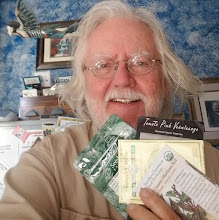 Corn is one of the most hybridized plants in our world today, but most of the hybrids developed in the past 50 years has nothing I want in my garden. This ancient race of corn, at present not precisely identified, from the Native Seed/SEARCH collection does have traits I want: It is a dent corn, meaning it has the keeping qualities of a flint combined with the finer grain of a flour corn. The blue tint holds higher nutrition. One of my projects now is to develop a blue (higher nutrition), dent corn (longer shelf life and finer grain - dents also tend to be among the more productive corn races). I have two corn breeding projects on the books right now.
Corn is one of the most hybridized plants in our world today, but most of the hybrids developed in the past 50 years has nothing I want in my garden. This ancient race of corn, at present not precisely identified, from the Native Seed/SEARCH collection does have traits I want: It is a dent corn, meaning it has the keeping qualities of a flint combined with the finer grain of a flour corn. The blue tint holds higher nutrition. One of my projects now is to develop a blue (higher nutrition), dent corn (longer shelf life and finer grain - dents also tend to be among the more productive corn races). I have two corn breeding projects on the books right now.Even by the time the professionals were breeding plants – before the genetic modification started – the intent was no longer to breed plants for any kind of long term strategy. Just like modern Wall Street, the idea became to get in, make a buck and not be around when the thing imploded. Home gardeners and food consumers became the victims of this make-a-buck strategy. Mind you, the mantra of the promoters of this type of agricultural advancement was: Cheap food – at any price. And no other country bought it up the same way Americans did. And still do. What's the best food store has almost always been the cheapest – a mold that is being broken by Whole Foods Market and that's about the only bone I'll throw them.
It's an odd thing that among 1st World Countries, Americans are the most likely to think food has to be cheap. And, in that guise, we went along for it. Cheap and easy was our national anthem from way before the American Revolution. But the trade offs were huge! Nutrition and taste were not important and were not considered as a 'desirable' outcome of the research.
During this time, the old kind of plant breeding comprised an ever shrinking portion of the plant breeding. And while modern science was breeding in disease resistance to tomatoes and other vegetables, the open pollinated plants were left alone. “Breeding resistance” into plants is another way to describe “breeding more virulent diseases” because, as the plants become resistant, diseases co-evolve to take on the new, improved plants. The net effect of this is that our cherished heirlooms have been compromised by a lack of disease resistance to diseases that weren't around when our treasured plants were being bred.
Now is the time to move beyond 'saving heirlooms.' That is old hat. We have saved a lot of them. Now, we must begin to move beyond just 'saving' them. We must begin to adapt them to our world. We need to confer disease resistance on these tasty and rich jewels of cuisine if we are going to be able to keep them and if they will be the basis of an agriculture that keeps us from starving when the chemicated, profit driven agriculture turns on us by failing to deliver – which it will do sooner or later.
So the challenge before us is to do the work of breeding disease resistance from the hybrids (not the GMOs – which is a different critter altogether and among our people is considered a contamination. There are many hybrids out there from which we can cull disease resistance or other qualities we find desirable in our food. In other words, the word 'hybrid' cannot be a bad or nasty word – we have come to a place where the word 'hybrid' has been far too demonized. It is true that the recent history of hybrids is tied in with the mad rush for profit, but the word itself simply means the 'product of a cross.' Hence most of our rich diverse, collection of open-pollinated plants are all hybrids; the difference that needs to be noted is that the open-pollinated plants are stable crosses – whereas the hybrids of the dollar are unstable crosses – in other words, they have not been grown out for successive generations to insure the good qualities are there to stay.
This work has begun already. Organic Seed Alliance in Oregon and Practical Farmers of Iowa both have breeding programs, although both are focused on farming crops.
Many organizations have been saving all this marvelous germplasm that is the basis for this work. We need to get busy - not only in continuing to save the germplasm, but also to breed resistance to the delicious tasting food our ancestors left for us. We need to be true to this treasure and the way best to do that is to not only save it as it is, but to breed it to compete in this modern world and produce fruit reliably and honestly for our children and their children.
david










.jpg)